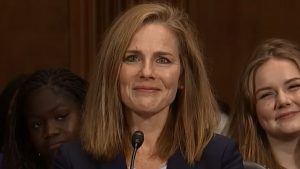(Photo by Joe Raedle/Getty Images,)
Sure, Amy Coney Barrett is still the odds on favorite to be Donald Trump’s pick to replace Ruth Bader Ginsburg on the Supreme Court, but it’s far from a done deal. The other name making its way up the shortlist is Eleventh Circuit judge Barbara Lagoa. So what does the president have to say about Judge Lagoa, a person, remember, he’s already appointed to a lifetime position:
She’s an extraordinary person. I’ve heard incredible things about her. I don’t know her. She’s Hispanic and highly respected. Miami. Highly respected.
Well, that’s a thing, and probably way more telling than Trump intended. Bloomberg notes the electoral implications if Trump picks Lagoa:
Lagoa’s legal bona fides hold some political appeal for Trump as the election bears down — a woman of Hispanic heritage from Florida is a trifecta of forces that will help make or break Trump’s fate this fall. He’s trailing Biden in Florida and trailing widely among women, but polls show he’s doing better among Hispanic voters than he did in 2016.
But what do you — and the president, apparently — need to know about the potential SCOTUS pick? Well, she’s the daughter of Cuban immigrants, something that comes up a lot in the talking points about her. She attended Florida International University for undergrad, and got her JD from Columbia. She did a stint in Biglaw and was an Assistant United States Attorney for the Southern District of Florida in the Civil, Major Crimes, and Appellate Sections.
Lagoa’s time at Greenberg Traurig — from 1998 to 2002 — was noteworthy. During that time, she was the lead in the case of Elian Gonzalez, the Cuban minor who sought asylum in the U.S., as reported by Law.com:
According to her disclosure papers to the U.S. Senate, she was Greenberg’s lead attorney in the case of Elian Gonzalez, a minor who sought asylum in the United States after his family’s boat capsized on its way from Cuba in 1999. Lagoa argued the case pro bono with two other Greenberg attorneys, she wrote in the disclosure.
She also had some famous clients back then:
She also represented former Van Halen singer Sammy Hagar in a lawsuit seeking to block an unauthorized biography and represented Leor Dimant of the musical group House of Pain in an insurance case after he was involved in an altercation at a Miami Beach club.
Then, in 2006, she was appointed to the Florida Third District Court of Appeal by Jeb Bush. In January of 2019, Ron DeSantis appointed her to the Florida supreme court. Her judicial record in state court reflects a staunchly conservative record:
On Florida’s high court, and before that, on a state appeals court, she repeatedly sided with businesses, helping to turn back a higher minimum wage in Miami, limiting recourse for homeowners facing foreclosure, and reversing or rejecting cases of employees who sued Caterpillar and Uber. Lagoa also wrote a controversial decision finding that DeSantis had broad executive authority to suspend a county sheriff over his handling of the 2018 shooting in Parkland, Fla.
But 2019 was a banner year for Lagoa. In October of 2019, she was nominated to the Eleventh Circuit and in December, she was sworn in. That’s right — Lagoa has been a federal judge for less than a year and she’s already up for a promotion. But don’t worry — this is COMPLETELY NORMAL.
During her confirmation, Lagoa said the right (read: conservative) thing about her judicial philosophy:
“To me, the term ‘judicial activism’ means that a judge is reaching a result based on the judge’s own personal preference. And that is antithetical to what I believe a judge should be,” she later said.
Lagoa said she sometimes personally disagrees with her decisions, and that originalism is an important principle for judges in interpreting the meaning of the U.S. Constitution. “If we are not bound by what the Constitution means, and it’s — it is ever-changing, then we are no different than the country that my parents fled from which is Cuba,” she said. The biography submitted to the Senate ahead of her hearing said she’d been a member of the conservative Federalist Society since 1998. She was confirmed by the Senate by a vote of 80-15.
Though that bipartisan confirmation is being treated with suspicion among some on the far right:
[Coney Barrett backer Tony Perkins of the Family Research Council] said he also raised concerns about Lagoa, whom he describes as a relative unknown. The fact that more than two dozen Democratic senators voted for her 2019 confirmation to her current seat has raised suspicions, Perkins said. (That bipartisan vote is a plus in the eyes of Lagoa’s backers.)
But even in her brief amount of time on the Eleventh Circuit, she’s already proven herself willing to uphold conservative policy goals, even in the face of an overwhelmingly popular ballot measure. She demonstrated her hostility to voting rights, upholding the Republican measure to have former felons who were re-enfranchised in Florida pay undisclosed amounts of fees to actually exercise their rights, as per AP:
In her short tenure on the 11th Circuit, one controversial ruling in which she was among five Trump appointees in the majority was a 6-4 decision earlier this month that Florida felons had to not only complete their prison time but also pay any fines, fees and restitution.
And as noted by Marc Joseph Stern, Lagoa wrote in support of poll taxes, in a move characterized as auditioning for her place on the SCOTUS shortlist:
Lagoa also wrote her own concurrence, joined by no one, that would gut constitutional protections against wealth-based voter suppression. She argued that judges should generally uphold poll taxes when indigent citizens have “alternative avenues” to vote—even when those avenues are arbitrary, discriminatory, or downright illusory. In Florida, people with felony convictions can theoretically regain the right to vote by seeking executive clemency. The state’s clemency board is notoriously biased toward white people and Republicans and rejects the vast majority of applicants, usually for no stated reason. According to Lagoa, however, those biases don’t matter. As long as people theoretically have another way to restore their voting rights, the state may saddle them with a poll tax that they cannot afford to pay.
There is a word for what Lagoa did throughout the Amendment 4 litigation: auditioning. Lagoa proved to Trump that she would even defy judicial ethics to come through for him on a case that could swing the election. Nobody should’ve been surprised when she appeared on the president’s latest Supreme Court shortlist.
And the issue of recusals the Supreme Court struggles with, yeah, it’s not going to get better:
There were calls from supporters of the original felon voting amendment for Lagoa and a fellow 11th Circuit Judge, Robert Luck, to recuse themselves from the case because they participated in a state Supreme Court case on the issue but neither did.
And though it’s one case, it’s a pretty big deal, and could easily be the difference in deciding Florida’s electoral votes.
Lagoa is not just conservative—she’s also a partisan who flouted judicial ethics to disenfranchise hundreds of thousands of people in Florida, potentially throwing the state to Trump. Lagoa’s unprincipled conduct in that case makes her a perfect candidate for the president’s midnight appointment.
And, of course, since Lagoa’s time on the federal bench is so short, we are forced to look at her carefully crafted statement on the issue of reproductive freedom, which, basically tells us nothing:
In response to written questions from Democratic Sen. Dianne Feinstein of California, Lagoa said the 1973 decision “is binding precedent of the Supreme Court and I would faithfully follow it,” noting that for “lower court judges, all Supreme Court precedent, including Roe v. Wade … is settled law.”
Lagoa is married to Jones Day attorney Paul Huck Jr., described as the “godfather of the Federalist Society in Miami.” Her father-in-law is Southern District of Florida judge Paul C. Huck (appointed by Bill Clinton in 2000). And she has three kids.
Listen, she hasn’t been a federal judge for very long, but I think we know all we need to about the kind of Supreme Court justice that Barbara Lagoa would be.
 Kathryn Rubino is a Senior Editor at Above the Law, and host of The Jabot podcast. AtL tipsters are the best, so please connect with her. Feel free to email her with any tips, questions, or comments and follow her on Twitter (@Kathryn1).
Kathryn Rubino is a Senior Editor at Above the Law, and host of The Jabot podcast. AtL tipsters are the best, so please connect with her. Feel free to email her with any tips, questions, or comments and follow her on Twitter (@Kathryn1).
 Staci Zaretsky is a senior editor at Above the Law, where she’s worked since 2011. She’d love to hear from you, so please feel free to email her with any tips, questions, comments, or critiques. You can follow her on Twitter or connect with her on LinkedIn.
Staci Zaretsky is a senior editor at Above the Law, where she’s worked since 2011. She’d love to hear from you, so please feel free to email her with any tips, questions, comments, or critiques. You can follow her on Twitter or connect with her on LinkedIn.


 Jill Switzer has been an active member of the State Bar of California for over 40 years. She remembers practicing law in a kinder, gentler time. She’s had a diverse legal career, including stints as a deputy district attorney, a solo practice, and several senior in-house gigs. She now mediates full-time, which gives her the opportunity to see dinosaurs, millennials, and those in-between interact — it’s not always civil. You can reach her by email at
Jill Switzer has been an active member of the State Bar of California for over 40 years. She remembers practicing law in a kinder, gentler time. She’s had a diverse legal career, including stints as a deputy district attorney, a solo practice, and several senior in-house gigs. She now mediates full-time, which gives her the opportunity to see dinosaurs, millennials, and those in-between interact — it’s not always civil. You can reach her by email at 


 Jordan Rothman is a partner of
Jordan Rothman is a partner of 


 Ellen Trachman is the Managing Attorney of
Ellen Trachman is the Managing Attorney of 




 Kathryn Rubino is a Senior Editor at Above the Law, and host of
Kathryn Rubino is a Senior Editor at Above the Law, and host of